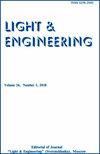隧道照明:用C语言确定隧道区域照度标准值的算法
IF 0.3
4区 工程技术
Q4 ENGINEERING, ELECTRICAL & ELECTRONIC
引用次数: 0
摘要
隧道照明设计涉及复杂的数学计算,手工操作繁琐、繁琐。本文根据国际照明委员会(CIE88:2004)的标准设计准则,采用C语言编程,提出了一种计算隧道不同区域亮度和光通量的算法。计算了各区域的亮度和光通量值,并与CIE标准进行了比较。每个区域的能源消耗都同样可以控制和减少能源浪费和支付不必要的账单。阈值区长度Lth,前半段Lav平均亮度为40 m,后半段Lav平均亮度为400 cd/m2,后半段Lav平均亮度为240 cd/m2,过渡段和内段平均亮度分别为95.87 cd/m2和5.86 cd/m2。所得结果令人满意。计算结果表明,该算法可用于设计高效、节能的隧道照明系统。本文章由计算机程序翻译,如有差异,请以英文原文为准。
Tunnel Illumination: Algorithm to Determine Standard Values of Luminance in Tunnel Zones Using C Programming Language Approach
Tunnel illumination design involves complex mathematical computation, cumbersome, and tedious to perform when done by hand. This paper proposes an algorithm to compute luminance and luminous flux of the different zones of the tunnel by following the International Commission on Illumination (CIE88:2004) standard design guidelines using the C programming language. The luminance and the luminous flux values of all the zones were calculated and compared with the CIE standard. The energy consumption of each zone is equally found to control and reduce energy wastage and payment of unwanted bills. The threshold zone length Lth, average luminance in the first half Lav, and the last half of the threshold zone are 40 m, 400 cd/m2, and 240 cd/m2, respectively, while the average luminance of the transition and interior zones are, respectively, 95.87 cd/m2 and 5.86 cd/m2. The results obtained were satisfying. The computational results showed that the proposed Algorithm could be used to design an efficient tunnel illumination system with less energy waste.
求助全文
通过发布文献求助,成功后即可免费获取论文全文。
去求助
来源期刊

Light & Engineering
ENGINEERING, ELECTRICAL & ELECTRONIC-OPTICS
CiteScore
1.00
自引率
50.00%
发文量
0
审稿时长
1 months
期刊介绍:
Our magazine
develops comprehensive communication within the lighting community, providing opportunities for discussion and free expression of opinions of specialists of different profiles;
contributes to the convergence of science and engineering practice, the search for opportunities for the application of research results in lighting and technological applications of light;
keeps the scientific community up to date with the latest advances in the theory of the light field, providing readers with operational professional information;
initiates international cooperation, promotes and distributes the results of Russian authors in the international professional community;
provides equal opportunities for authors from different regions of Russia and other countries.
The journal publishes articles in the following areas:
visual and non-visual effects of radiation on humans;
light field theory;
photometry and colorimetry;
sources of light;
ballasts;
light devices, their design and production technology;
lighting and irradiation installation;
light signaling;
methods of mathematical modeling of light devices and installations;
problems of energy saving in lighting, installation and operation of lighting installations;
modern production technologies of lighting products for lighting control systems;
innovative design solutions;
innovations in lighting and lighting design;
the study of the effect on plants and animals, problems of using light in medicine;
problems of disinfection of premises, water and smell elimination with the help of technology of UV radiation using;
problems of light in the ocean and space.
 求助内容:
求助内容: 应助结果提醒方式:
应助结果提醒方式:


